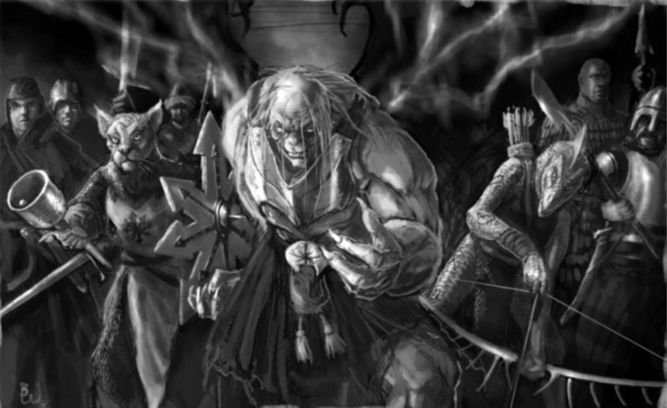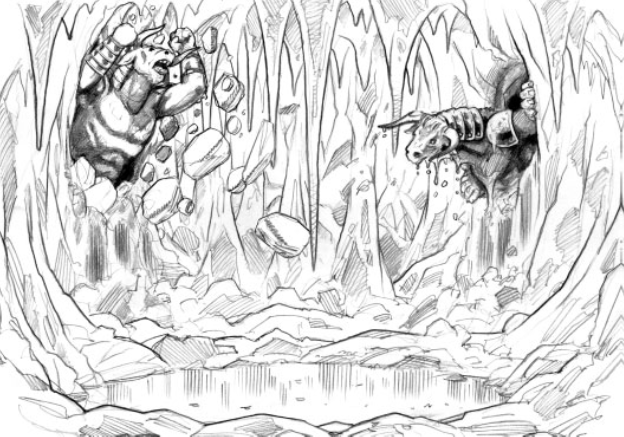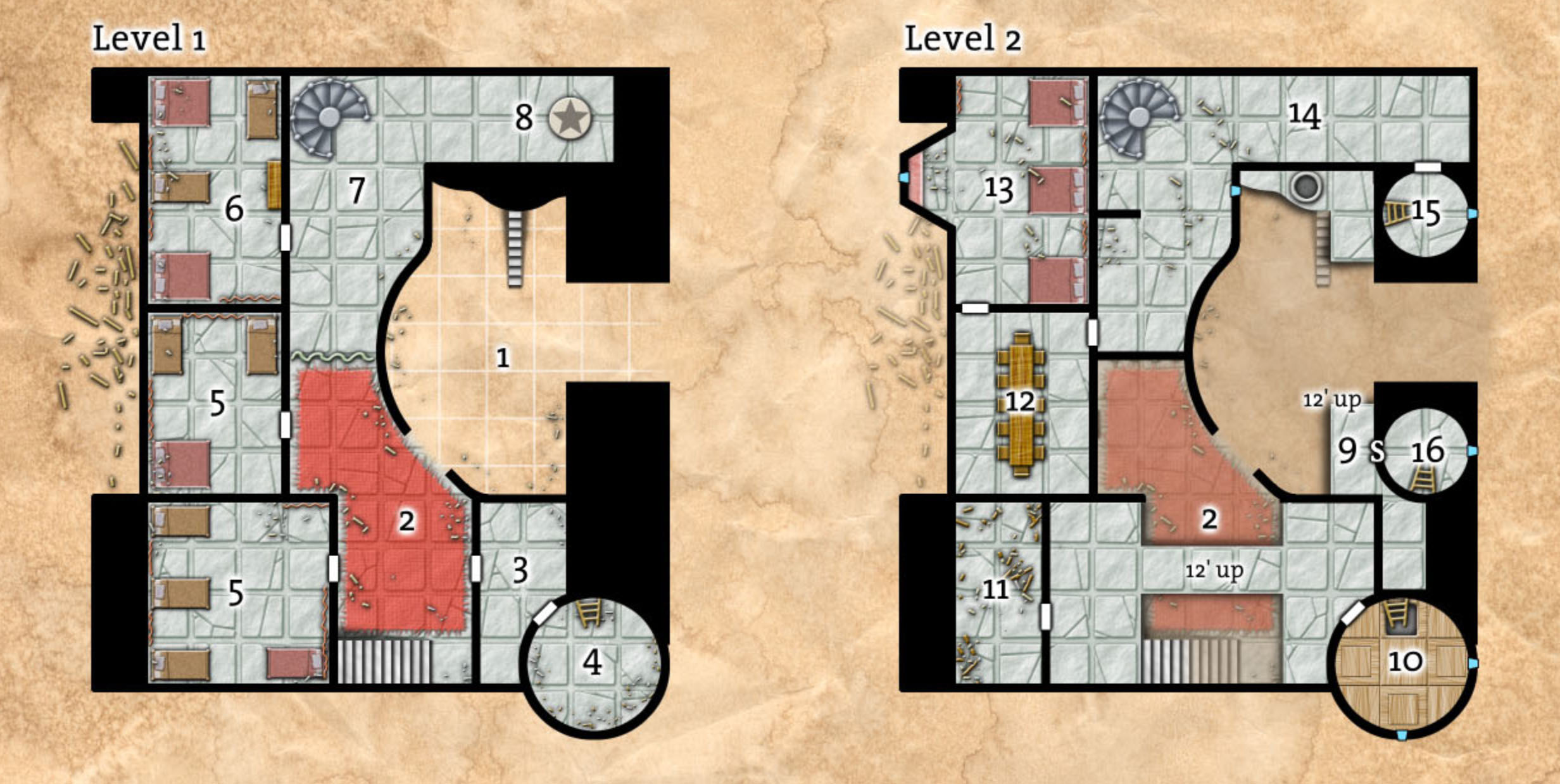 IN THE SHADOW OF THE SPIRE
IN THE SHADOW OF THE SPIRE
SESSION 23E: WITH NOUGHT BUT THEIR LIVES
June 7th, 2008
The 11th Day of Kadal in the 790th Year of the Seyrunian Dynasty
BATTLE OF THE MINOTAURS
Tee gathered up the items, put them into her bag of holding, and then headed back towards the underwater tunnel.
“Wait,” Elestra said. “What about the key we came for?”
Tee looked at her quizzically. “I think it was the key from the chest.”
“The one that hurt you? But that doesn’t make any sense. And we’ve found lots of keys here. Maybe there’s another one. Why would we want a key that hurts you to use it?”
“We don’t know why we wanted the key,” Tee said. “We don’t know what it’s for.”
“We should open the door,” Elestra said. “See if there’s another key back there.”
“The door the minotaurs were afraid of?” Tee said. “I don’t think that’s a good idea.”
“Maybe they were just pretending to be afraid.”
The argument continued for several minutes, but eventually it was decided that they would at least look through the door. Tee picked the lock and edged the door open, peeking through it.
There was another icy cavern, this one larger than the rest. A multi-headed construct of frost-rimed brass and levianthan proportions lay in a heap in the center of the floor. But even as Tee’s eye  fell upon it, the construct stirred – one of its heads slowly rearing up with the rasping sound of metal upon metal.
fell upon it, the construct stirred – one of its heads slowly rearing up with the rasping sound of metal upon metal.
Tee slammed the door shut.
“We need to go. Now.”
WHAM!
The cavern rocked with the bone-shaking impact of the construct on the far side of the door.
“What is it?”
WHAM!
“Go! Now!”
They fled back through the underwater tunnel and up through the fleshy membrane… and found the minotaurs waiting for them.
“Segginal tells us that Wuntad sent you on a mission. Give us the weapons of chaos.”
Tee was bleary-eyed and exhausted, still suffering from the ill effects of using the key. She didn’t want to do it, but they didn’t seem to have any other choice. With a heavy sigh she reached into her bag, pulled out the spear, and handed it to the nearest minotaur.
Agnarr attacked.
“Agnarr! No!” Tee was perhaps even more surprised than the minotaurs. Her hand was still half in her bag of holding, reaching for the next item. She quickly changed her aim and withdrew the modified dragon rifle. But she was too weak to fight, and simply stumbled back towards the nearest corner.
The minotaurs roared. The claws of one smashed into Agnarr’s side, sending him spinning towards the other who caught him with a similarly devastating blow. Agnarr dropped to one knee. He swung his sword feebly towards them, but then a third blow crashed down on his head and he slumped into unconsciousness.
Tor hesitated, his sword half-drawn from its sheath, waiting to see what would happen. With Agnarr down, would Tee begin negotiating again?
Perhaps she might have, but even as Agnarr thudded heavily to the ground, Dominic extended his hand and murmured a prayer. A bolt of silvery energy emerged from his fingertips and struck one of the minotaurs. The energy flowed about the creature as if it were liquid mercury, and the motions of the minotaur slowed… and stopped. It had become frozen in time.
Tor finished drawing his sword and charged the other minotaur. He nimbly weaved his way through the flurrying claws of the creature, turning the closer blows with his shield. His sword, crackling with electricity, struck here and there – opening painful wounds in the creature’s thick hide.
As Tor kept the creature occupied, Elestra and Dominic darted forward and laid their hands on Agnarr. Their joint strength flowed into the barbarian, healing his wounds.
As Agnarr groggily regained his consciousness he quickly focused on the battle being waged almost directly above him between Tor and minotaur. He grabbed up his sword and stabbed up… straight through the minotaur’s groin. The creature gave a bellowing roar of unimaginable pain and collapsed in a pool of its own blood and viscera.
As Agnarr stood up, shaking off some of that same blood and viscera, Tee weakly stepped forward, lowered the modified dragon rifle, and immolated the surviving minotaur (who was still trapped by Dominic’s spell).
LEAVING WITH THEIR LIVES
“Wuntad is very angry with you.”
It was the voice of Segginal – the statue-bound chaos spirit.
“I don’t care, Segginal.” Tee shouted. “Open up!”
After a moment, the statue above them slid aside. They climbed up and then moved away from the statue before discussing their options.
“We could still try to escape,” Agnarr said.
Tee shook her head. “We couldn’t beat them before and now I’m less than useless in a fight.”
“They might have left.”
“I doubt it,” Tee said. “But we can check.
They climbed up to the second floor, hoping to look down through one of the tower windows. As they reached the tower, Elestra asked the question that was weighing on everyone’s mind: “Do you think the Segginal guy is telling Wuntad where we are?”
Tee looked out through the window. “Yeah… I think he is.”
Wuntad was standing on the path before the gate, staring straight up at her. He was now accompanied by more than a dozen of the cultists. Now he shouted, his voice loud enough to be heard through the lead-framed window.
“The minotaurs don’t matter to me! They were foul, primitive creatures. Unworthy servants. All I want are the weapons! Give them to me and you can still leave here with your lives!”
“Damn it.” Tee sighed heavily and turned away from the window.
“We’re not going to give them to him, are we?” Elestra asked.
Tee looked at her. “I’ll say it again: Do we have any other choice?”
“But we can’t! We don’t know what he’ll do with them if he gets them!”
“But we do know what he’ll do if he doesn’t get them.”
“We could always try going out the back way,” Dominic suggested.
“With Segginal telling him everything we’re doing?” Tee said.
“If we do give them to him,” Tor said. “I don’t want to go out there. I’m sure he’ll betray us.”
“Maybe we could get the Cobbledman to give him the items? I don’t think he can actually come into the keep. Otherwise he would have just killed us and gotten the weapons himself. Or done it years ago.”
A shadow fell across them. Wuntad had flown up to the window and was looking in at them. “This is your last chance.”
“Will you agree to free the Cobbledman?” Tee asked.
Wuntad’s eyes narrowed. “He lives?”
“He does. And he misses you.”
Wuntad seemed to mull it over for a moment. “Very well. If you give me the weapons, I will free the Cobbledman.”
“Fine,” Tee said. “We’ll have him bring the items to you.”
They found the Cobbledman, once again, sleeping in his tower. Tee carefully woke him.
“Cobbledman? Wuntad is here.”
“Wuntad’s here?”
“He is. He’d like to see you. He wants to free you. But I need to ask you a favor.” Tee quickly explained what they needed the Cobbledman to do.
They went down to the courtyard. Wuntad and the cultists were waiting just outside the gate. Tee loaded the Cobbledman’s arms full with the various weapons… but she deliberately held back three items: The journal, the ironwood box inscribed with Lithuin runes (and the crystals it held), and the golden key. She hoped that Wuntad might not notice the missing items, and if he did then—
“Where is the box of ironwood?” There was great anger in Wuntad’s voice.
“It’s right here,” Tee said, pulling it from her bag. “But his arms were full. Send him back and he can bring it out to you.”
And, as she had hoped, Wuntad had noticed the missing item most precious to him… but not the key. Nor did he open the ironwood box and notice that the journal was missing.
“Cobbledman,” Wuntad said. “You are free to leave Pythoness House.”
Wuntad then turned to them. “I am glad that you saw… reason. But pray that our paths do not cross again.”
The cultists turned and left. The Cobbledman came back towards them, a wide grin on his kind face. “Did you hear?”
“We did,” Tee smiled. “I’m very happy for you.”
“Do you have any more food?”
Ranthir laughed and handed him another bar of rations. The Cobbledman, munching contentedly, headed back towards his tower.
“We should do something for him,” Tor said. “He shouldn’t have to stay here.”
“What about those people that Urlenius was talking about?” Tee suggested.
“The Brotherhood of Redemption?” Dominic said.
“Right. They might be willing to help him.” She looked around. The cultists were gone. “Well, shall we go?”
“Not yet,” Agnarr said. “There’s one more thing I want to do.”
Agnarr returned to the statue of Segginal… and smashed it to pieces. As the last of his destructive work was done, a mournful wind howled through the keep and, with a malevolent laugh, Segginal’s voice echoed through the halls: “You will bear my curse forever.”
Agnarr grunted. “Nice guy.”
A PEACEFUL AFTERNOON
As they emerged from Pythoness House, the aeroship of House Shever passed above them – heading out towards the Southern Sea. They followed in its wake, heading down into Midtown and returning to the Ghostly Minstrel.
Tee had an appointment to keep, so she only stopped in long enough to drop off her bag of holding (with its tainted items and, most importantly, the soul draining key) and then left again.
Tor, too, only went to his room long enough to pick up a fresh set of clothes before heading over to the bathhouse on Tavern Row. (Where he sat quietly in a corner, speaking to no one.)
Agnarr headed to the common room and ordered a meal of feast-like proportions.
Elestra and Dominic, meanwhile, talked things over and decided to spend the afternoon trying to find help for the Cobbledman. Elestra knew that the Brotherhood of Redemption maintained a small chapterhouse in the Guildsman District (although there were rumors that they also maintained a large underground fortress somewhere beneath the city).
As Elestra and Dominic headed back out through the front hall, however, a cry came from the common room. “Mistress Elestra! Mistress Elestra!”
Before she even turned to look, Elestra knew that it was Iltumar. She suppressed a groan.
Iltumar was sitting at a table with an elven woman with dark brown hair. The glint of mithril chain could be seen under the woman’s clothes.
“Elestra, this is Lavis,” Iltumar said. “I’ve solved Tee’s riddle! The answer is ‘t’! T for Tee!”
“Very good, Iltumar!” Elestra smiled, exchanging a look with Dominic.
“I’ve got a new one for you, too: ‘My house is not quiet, but I am not loud. I am the swifter, at times the stronger. My house more enduring, longer to last. At times I will rest, but my house rushes on. Within it I lodge as long as I live. Should we two be severed, my death becomes sure.’”
Elestra leaned over towards Dominic. “Do you think it’s a snail? I think it might be a snail.”
Dominic shrugged.
“Do you want to join us for a drink?” Iltumar asked eagerly.
Elestra turned back to him. “I’m sorry, Iltumar. But Dominic and I have something we need to do. In fact, we were just heading out.”
Iltumar’s smile fell away.
“But I’ll let Tee know about your new riddle. I know she’ll be excited to hear it.”
“It’s okay,” Iltumar said. “I know you probably have much more important people to see.”
Elestra awkwardly tried to figure out how to make her farewells. Lavis exchanged a sympathetic look with her. But, at that moment, Ranthir was passing by on his way to fetch his customary bowl of soup for the evening. Overhearing her distress, he tapped Iltumar on the shoulder.
“Iltumar, I have some studies to attend to this evening. Would you, perchance, be interested in assisting me?”
Iltumar’s smile returned, even larger than before. “Really?”
“Yes,” Ranthir smiled. “I have to fetch some food, but then we could begin immediately… if you like.”
FOURTH LESSON OF THE DREAMING
Tee – weakened by the draining effects of the golden key and distracted by the myriad thoughts racing through her mind – had difficulty focusing upon her training. She had difficulty even achieving the dreaming trance, and could do little of consequence.
When the frustrating trance work was completed, Tee began gathering up her things to leave. But Doraedian stopped her.
“The dreaming trance requires a difficult art of balance. It shall never be without effort, although you will find that it becomes easier in time. However, there is another matter that we must discuss today. There are many paths through the arts of the Dreaming, and from this day forward your training will be of your choosing.”
“Choosing?” Tee said.
“Yes, while your lessons with me will continue, you will also be trained in one of three specialties.
“First, there is the Dreamsight. The Dreaming is the wellspring from which all reality is born and the grave to which all living memory returns. As such, those who can see the Dreaming with unclouded eyes can perceive deep truths of the world around them.
“Second, there are the Dream Pacts. The Lords of the Dreaming are powerful and fey. Those skilled enough in the dreaming arts can turn their souls into conduits through which the Spirit Lords can be made manifest in the world around us. But following such a path requires supreme self-control, for the Lords of the Dreaming are capable of reshaping your very soul.
“Finally, there is the art of Dreamspeaking. Those practiced in the dreaming arts can reshape the Dreaming around them. Those who are masters of the Dreaming, however, can reshape the world around them by reshaping the dreams from which the world is born. These arts have been perfected into the dreaming tongue – a primal language which not only describes the most fundamental aspects of reality, but can be used to transform it.”
“I’m not sure what I want to do.”
“It is not a decision to be rushed. Take your time. Explore your thoughts. Write me by letter before your next lesson on the 18th and let me know your choice.”
NEXT:
Running the Campaign: Diegetic Mechanics – Campaign Journal: Session 23F
In the Shadow of the Spire: Index


















